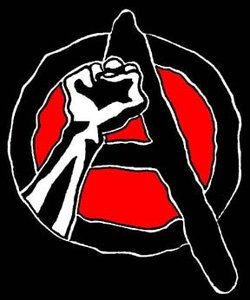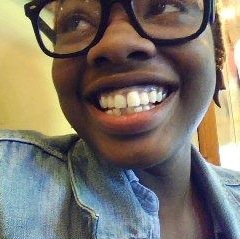|
12/26/2011 Call: Must I Be Anarchist?
 (Or, Why Are All the Anarchists Sitting Together in the Cafeteria?) 1 Editor’s Note: This piece is part one of a series of call and response between Amaryah Armstrong and Nekeisha Alexis-Baker as they consider what possibilities Christian anarchy can provide for marginalized peoples. The conversation grows out of friendship and mutual respect for each other, and from our commitments to living lives of liberation. We aim for to be an ongoing dialogue that builds on each call and response. As a result, we strongly encourage you to begin at the beginning and follow along from there. You can read Nekeisha’s response here. I must confess, I simply don’t know what to do with Christian anarchists. I am anti-domination, anti-capitalism, critical of technology, more than a little suspicious of the nation-state, and all about my citizenship being in heaven and thus having a commitment to radical politics on earth. But still, something about “Christian anarchists” just doesn’t sit well with me. It could be the irony of Christian anarchy being anti-domination and yet being predicated on domination by White men. But this is no different from other Christian identified radical groups. Exclusion is a practice we all participate in. Perhaps it is that I have yet to see or read or participate in sustained Christian anarchist discussions of White supremacy, patriarchy, and heteronormativity that go beyond the niceties of anti-racism/sexism/homophobia 101 training. Or maybe it is because explications of why anarchy is a valuable way to dismantle these systems of evil never seems to offer anything radical feminist, black, and queer Christian critiques have not already begun to deal with. Let me show my cards here and share honest reflections about my hang-ups with Christian Anarchy: as a Queer, black woman, I have yet to see many reasons why Christian anarchy would provide a space that would do the work that needs to be done to fight White supremacy, patriarchy, and heteronormativity. Critiques of the state and domination are all well and good, but folks who haven’t seen themselves as anarchist have held radical critiques of power, of war, of domination and have also given attention to the ways race, sex, and heterosexism become the occasions for the articulation of dominance and power. What is unique about the way anarchy wants to talk about power and domination that makes it compatible with Christianity? Perhaps you all may try to point me to Mark’s recent primers on Christian Anarchy or some of Jacques Ellul’s work. Thanks, I’ve read those. And I still have my questions. To me, the tent of “Christian Anarchy” might have more potential as a radicalizing space for white folks to organize under than as a multi-racial tent for a collective of people from the margins and the center. What I mean is this: it is easy to suggest that Christian anarchism provides valuable critiques and resources for how we might live more faithfully to God. But it is not as easy to see and remedy the fact that the resources available on this site themselves are woefully lacking in representation from anyone who is not a White man. And this is not to unfairly castigate the folks who spend much of their time and resources providing a space where radical discussions of Christianity can take place, or to suggest that if something is lacking from this website, I can’t work to fill it (which is part of the reason I’m writing this in the first place). But it is to say, that those voices who get cited as the core of a Christian anarchist movement don’t seem to look like me at all. And they not only don’t look like me (because one doesn’t have to look like me to have powerful critiques of domination), but radical voices who do come from social locations more like mine also become a secondary addendum to that canon. These voices which are, in my eyes, inseparable from any struggle for liberation, become voices that gird up the claims that have already been made by white men, rather than leading the discussion. What I’m trying to point out, then, is the way the narrative already gets structured from the beginning to be one that has to be pried open to include others and the way this inclusive expansion can act more as a way of soothing guilt after the fact than as a catalyst to disrupt the ways Christian anarchy continues to begin from a particular place of domination by white men in order to move towards a more inclusive place. 2 I want to know: how long must this story be told this way? I also wanted to speak to the strand of anarcho-primitivism that also seems to be popular in Christian anarchist circles. I want to ask how does anarcho-primitivism not become simply another strand of the larger American imagination that has been obsessed with the primitive 3, and particularly the ways black and brown bodies have been seen as closer to primitive because they are not White? 4 What about an anarcho-primitivist narrative, if anything, distinguishes it from the subsuming and homogenizing project of White Western colonialism? What about an anarcho-primitivist narrative calls for transformation of White folks from collusion with White supremacy to solidarity with folks of color? Beyond dreading hair, or buying indigenous jewelry, what about Whiteness is transformed by anarcho-primitivism? I ask this, not because I like picking on White folks, but because the cultural appropriation that takes place within these circles is so rampant, and is done in spaces that are divorced from sustained critiques of White supremacy and accountability to persons of color. Also, I think once we can begin to converse about how Whiteness must become transgressive, bodies of color do not have to be relied on for the articulation of White subjectivity. Now, I’m not trying to be rude or spiteful just for the sake of it (some of my best friends are white guys with dreads), but because I do view Jesus Radicals as a valuable website, and the annual conference as a wonderful resource for radical Christianity. But I also see how this space might never expand beyond a primarily white hetero audience because of its structure and the places power resides in secret. So, I’ve taken to calling myself a Queer Black Feminist with anarchist impulses and I think that suits me well because anarchy seems to work better as an adjective than a noun, for me, but I wonder what work anarchy does for Christians who might identify in that way? The recent Occupy movement has done a lot to confirm my sneaking suspicion that anarchist ideas are not simply anarchist, but can be radically feminist, queer, black, and Christian. But there have also been issues that have confirmed my sneaking suspicion that anarchist ideas are not radically feminist, queer, black, or Christian. Am I wrong in my perception? I am hoping this will be a conversation that will produce fruitful and respectful conversations. Notes:
|
Disclaimer
The viewpoints expressed in each reader-submitted article are the authors own, and not an “official Jesus Radicals” position. For more on our editorial policies, visit our submissions page. If you want to contact an author or you have questions, suggestions, or concerns, please contact us. CategoriesAll Accountability Advent Anarchism Animal Liberation Anthropocentrism Appropriation Biblical Exegesis Book Reviews Bread Capitalism Catholic Worker Christmas Civilization Community Complicity Confessing Cultural Hegemony Decolonization Direct Action Easter Economics Feminism Heteropatriarchy Immigration Imperialism Intersectionality Jesus Justice Lent Liberation Theology Love Mutual Liberation Nation-state Nonviolence Occupy Othering Pacifisim Peace Pedagogies Of Liberation Police Privilege Property Queer Racism Resistance Resurrection Sexuality Solidarity Speciesism Spiritual Practices Technology Temptation Veganism Violence War What We're Reading On . . . White Supremacy Zionism ContributorsNekeisha Alayna Alexis
Amaryah Armstrong Autumn Brown HH Brownsmith Jarrod Cochran Chelsea Collonge Keith Hebden Ric Hudgens Liza Minno Bloom Jocelyn Perry Eda Ruhiye Uca Joanna Shenk Nichola Torbett Mark VanSteenwyk Gregory Williams Archives
October 2017
|
Search by typing & pressing enter


 RSS Feed
RSS Feed